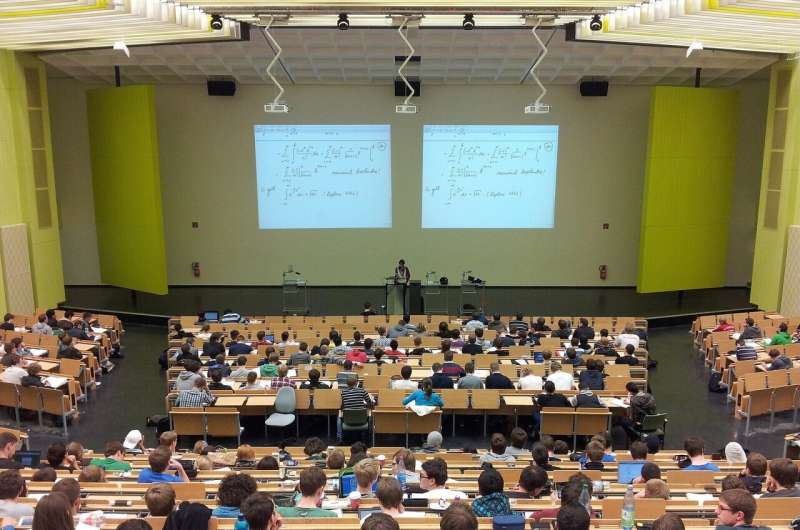This article has been reviewed according to Science X's editorial process and policies. Editors have highlighted the following attributes while ensuring the content's credibility:
fact-checked
trusted source
proofread
Educators can foster interpartisan friendships on college campuses, suggests study

As American society continues to divide along political lines, higher education and educators have unique potential to help foster interpartisan friendships, according to a new study from North Carolina State University.
The findings are based on data from the Interfaith Diversity Experiences and Attitudes Longitudinal Survey (IDEALS), a study that included 5,762 college students from 118 American colleges or universities. The students attended from 2015 to 2019. The open access paper, "Transforming Political Divides: How Student Identities and Campus Contexts Shape Interpartisan Friendships," is published in AERA Open.
The researchers identified several key points regarding the type of environment that may help facilitate friendships across political lines.
"What we took away is that people didn't have to significantly shift their political persuasions or perspectives in order to have these friendships. They were able to maintain some of those key identifiers or hallmarks associated with their political leaning," said Alyssa Rockenbach, corresponding author of the study and an Alumni Distinguished Graduate Professor at NC State.
"We also learned that a welcoming climate for people of different political leanings on campus is helpful."
When it comes to higher education specifically, students' perceptions of how faculty share political views affected their likelihood of forming interpartisan friendships even outside of the classroom. If students felt pressured to align their political views with those of their professors, they were less likely to form friendships across partisan lines.
"If you're in an environment where you're feeling pressured or coerced, that's going to make you take a step back from wanting to engage other people. It makes people more resistant and protective of themselves," Rockenbach said. "But simply having the political conversation in class or even faculty members sharing about their own political leanings is okay, so long as they are at the same time creating an open environment that does not feel coercive."
Students who had interpartisan friendships also tended to report that they had political disagreements within their friendships, but proved largely capable of resolving those disagreements and maintaining the relationship.
Friendships that bridge social divides serve an important and practical purpose, Rockenbach said. When people form friendships across political and ideological lines, they are more likely to be empathetic to the struggles of other groups. This idea is based on the theory of civic friendship, a concept dating back to Aristotle which contends that friendship not only provides personal benefits, but in fact plays a key role in creating the cohesion necessary for civilization.
"Friendship is linked to our ability to be moved by the issues that our friends face," Rockenbach said. "If we have friends of other identities, we're more likely to have empathy, we're more likely to care when they face injustices in society and to stand up for them."
This study, Rockenbach said, was the first step in determining the full extent of those effects. Further research focused on attitude change over time will be needed, she said, as well as to better understand where students see themselves on the political spectrum.
For instance, students who say they have friends who are politically different to them may be referring to someone who is still relatively similar, compared to having a friend on the complete opposite side of the political spectrum. Political identity comes with an inherent amount of gray area, Rockenbach said, but the new study provides an idea of how to begin bridging that divide.
"It's much messier than just democrat or republican, liberal or conservative," Rockenbach said. "We've talked about people making friends completely across the aisle, but what about the area in between? Maybe a first step is someone who is liberal becoming friends with a moderate.
"There is a lot of nuance across the political spectrum and a lot of possibility for easing some of the polarization that we see."
The study highlights obstacles to interpartisan friendships that may require larger systemic and societal changes to address, such as the hazards that marginalized groups may face when attempting to form friendships that cross political boundaries.
Black students, for instance, were less likely to form these types of friendships, as with anti-Black racism and white supremacy still prevalent in American society those relationships could pose too many risks. These fears likely extend to other vulnerable groups as well, including queer and trans students, religiously minoritized students, and undocumented students.
The study found that when trying to foster friendships, educators must also have conversations about personal boundaries and emotional safety. The study suggests that educators should present students with opportunities to foster friendships across partisan lines, but also understand that some friendships are not possible and to ultimately encourage students to identify what will work for them.
More information: Alyssa N. Rockenbach et al, Transforming Political Divides: How Student Identities and Campus Contexts Shape Interpartisan Friendships, AERA Open (2024). DOI: 10.1177/23328584231222475
Provided by North Carolina State University




















